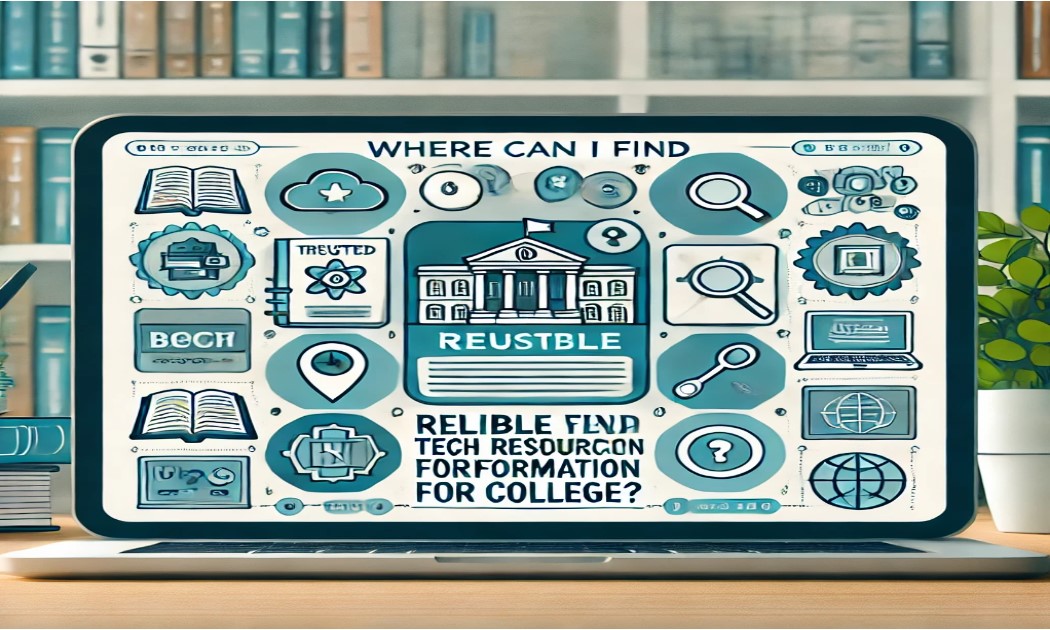
Where Can I Find Reliable Tech Information for College? Your Comprehensive Guide for 2024
In today’s digital world, access to reliable, up-to-date tech information is essential for college students across all fields. But with the vast amount of information available online, finding trustworthy and accurate sources can be challenging. This article is a complete guide on where to find reliable tech information for college, including the best resources, their advantages and disadvantages, examples of recommended websites, tips for evaluating credibility, and advice on applying this knowledge in academic settings.
Introduction: The Importance of Reliable Tech Information for College Students
Technology continues to evolve at a rapid pace, influencing almost every aspect of our lives, including education. College students, especially those in STEM fields, need current tech information to stay updated with trends, understand course concepts, and make informed career decisions. However, not all sources are credible, and outdated or inaccurate information can mislead students or hinder their academic performance.
Whether you’re looking for course resources, research data, industry trends, or tech tutorials, this guide covers everything you need to know to access reliable tech information.
History and Evolution of Tech Information Sources for Students
The ways college students access tech information have evolved alongside advancements in technology. In the past, students relied on physical textbooks, academic journals, and library archives. With the advent of the internet, a vast amount of information became available, but this also brought the need to discern credible sources from unreliable ones.
Today, tech information for college students is available through various digital platforms such as academic journals, online courses, tech blogs, forums, and educational websites, making it easier than ever to find and learn from reliable resources.
Reliable Sources for Tech Information
Below are some of the most trusted and reliable sources where college students can find up-to-date tech information:
1. Academic Journals and Databases
Examples: IEEE Xplore, JSTOR, ScienceDirect
Advantages: Peer-reviewed, high-quality, in-depth research on tech topics.
Disadvantages: Often requires subscriptions, although many universities provide free access to students.
2. Educational Websites and Online Courses
Examples: Coursera, edX, Khan Academy, MIT OpenCourseWare
Advantages: Structured courses, created by experts, often free or affordable.
Disadvantages: Course content may not be as up-to-date as tech news sources.
3. Tech Blogs and News Websites
Examples: TechCrunch, Wired, The Verge
Advantages: Regularly updated with the latest tech news, industry trends, and product reviews.
Disadvantages: May prioritize news over in-depth technical analysis; some content can be opinion-based.
4. Forums and Q&A Websites
Examples: Stack Overflow, Reddit (subreddits like r/technology and r/learnprogramming)
Advantages: Community-driven with practical advice and peer-reviewed answers.
Disadvantages: Quality varies, and accuracy isn’t always guaranteed, so double-checking facts is essential.
5. Government and Institutional Websites
Examples: National Institute of Standards and Technology (NIST), NASA, research institutes.
Advantages: Reliable, research-backed information, especially useful for advanced tech topics.
Disadvantages: Information may be highly specialized and not always beginner-friendly.
6. Libraries and University Resources
Examples: Digital libraries, university research databases, library archives.
Advantages: Free access to students with high-quality, peer-reviewed content.
Disadvantages: Some materials may require permissions, and content may not be as current as online news sites.
Popular Courses for Learning Technology in College
For college students seeking structured tech education, online courses and certification programs offer both flexibility and credibility. Here are some popular options:
Coursera Specializations - Courses from top universities in fields like AI, machine learning, and cybersecurity.
Google IT Support Professional Certificate - Beginner to intermediate IT skills, recognized by many employers.
edX Computer Science Programs - Free or affordable options in programming, data science, and more.
LinkedIn Learning - Extensive tech library covering software development, IT security, and other essential tech skills.
Advantages and Disadvantages of Different Sources
Advantages
Easy Accessibility: Most online tech resources are accessible 24/7, allowing students to study at their convenience.
Diverse Perspectives: From academic journals to community-driven forums, students can get both theoretical and practical insights.
Updated Information: Tech news sites and forums keep students informed of the latest advancements in real-time.
Disadvantages
Varied Quality: While academic journals and university resources are highly reliable, blogs and forums vary in accuracy and quality.
Subscription Fees: Many academic journals require subscriptions, though some universities provide free access.
Information Overload: With so much information available, finding trustworthy sources can be overwhelming.
How to Evaluate the Credibility of Tech Information Sources
Check the Author’s Credentials - Ensure the author has expertise in the tech field.
Verify Publication Date - Tech information should be current, as the field changes rapidly.
Look for Peer Reviews - Academic journals, reputable blogs, and sites like Stack Overflow have peer review processes.
Check Domain Authority - Government (.gov), educational (.edu), and well-known tech sites are generally more reliable.
Compare Multiple Sources - Cross-reference information from various sources to verify accuracy.
Example Problem and Solution Using Reliable Tech Information
Problem: A computer science student needs to learn Python for a class project and wants to find trustworthy resources to get up to speed quickly.
Solution:
Coursera offers Python for Everybody, a beginner-friendly course created by Dr. Charles Severance from the University of Michigan.
Stack Overflow can be used for quick answers to Python-related questions that arise during coding.
Python.org has extensive documentation and tutorials for in-depth learning.
MIT OpenCourseWare provides a free Python course that includes lecture notes and assignments for self-paced study.
Using these reliable resources, the student can gain foundational knowledge, troubleshoot problems, and build a practical understanding of Python.
Key Differences Between Academic and Community-Driven Tech Resources
| Feature | Academic Resources | Community-Driven Resources |
|---|---|---|
| Credibility | Peer-reviewed and fact-checked | Mixed; some expert, some opinion-based |
| Access | Often restricted or subscription-based | Generally free and easily accessible |
| Timeliness | May have publishing delays | Updated frequently, often in real-time |
| Perspective | Academic, research-oriented | Practical, real-world applications |
Advantages of Staying Updated with Reliable Tech Sources
Informed Decision-Making: Students can make better academic and career decisions with accurate, up-to-date information.
Enhanced Research Skills: Understanding how to find and evaluate reliable information builds essential research skills.
Increased Competitiveness: Knowledge of current industry trends gives students an edge in internships and job placements.
Conclusion: Mastering Reliable Tech Information for College Success
With countless sources available, navigating tech information can be overwhelming for college students. By using trustworthy resources like academic journals, educational websites, and peer-reviewed communities, students can gain accurate insights and make informed academic decisions. Armed with this guide, you’ll be better prepared to find reliable tech information and succeed in college.
By following this comprehensive guide, college students can find, evaluate, and apply reliable tech information to excel in their studies, stay updated with industry trends, and ultimately build a foundation for successful careers.
Frequently Asked Questions (FAQ)
Q. Where can I find reliable tech information for college?
A. You can find reliable tech information from academic journals (like IEEE Xplore), educational websites (such as Coursera), tech blogs (like TechCrunch), and forums (such as Stack Overflow). These resources provide up-to-date and credible insights.








